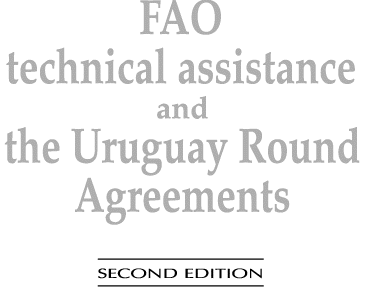
Rome, 1998 |
||
The designations employed and the presentation of material in this publication do not imply the expression of any opinion whatsoever on the part of the Food and Agriculture Organization of the United Nations concerning the legal status of any country, territory, city or area or of its authorities, or concerning the delimitation of its frontiers or boundaries.
M-70
All rights reserved. No part of this publication may be reproduced, stored in a retrieval system, or transmitted in any form or by any means, electronic, mechanical, photocopying or otherwise, without the prior permission of the copyright owner. Applications for such permission, with a statement of the purpose and extent of the reproduction, should be addressed to the Director, Information Division, Food and Agriculture Organization of the United Nations, Viale delle Terme di Caracalla, 00100 Rome, Italy.
� FAO 1998 |
The Uruguay Round Agreements represent a milestone in the multilateral trading system: for the first time, agriculture has been incorporated under operationally effective rules and disciplines. The Uruguay Round commitments in agriculture, forestry and fisheries cover improved market access and disciplines on domestic support and export subsidies. The commitments regarding market access are central to the broader package of interrelated liberalizing commitments aimed at significantly improving conditions of competition and opportunities for trade in agricultural products. The Uruguay Round Agreements also provide for limiting the scope for circumvention of the new commitments.
The Uruguay Round Agreements present opportunities for all countries to benefit from greater access to world markets by curbing past production- and trade-distorting practices and by facilitating more competitive and fairer trade. Signatories to the Agreements also assume the obligation of complying with their provisions. In order to fulfil this obligation and take advantage of the new opportunities, it is essential that countries develop their own capacity to examine, assess and evaluate their national circumstances in the context of the Agreements.
There are considerable differences in countries' ability to assess their specific circumstances, meet their Uruguay Round commitments in agriculture, forestry and fisheries and subsequently benefit from the results, and many will require technical assistance before they can do so. Because of its specialist expertise and unique position in international agricultural, forestry and fisheries affairs, FAO is well placed to provide that assistance.
The principal purpose of this booklet is to provide information on the technical assistance that FAO is able to provide member countries in building their capacity to deal with trade-related issues. This includes assistance not only in areas related to implementation of the Uruguay Round Agreements but also in preparing developing countries to participate as equal partners in multilateral trade negotiations, on which discussions should begin in 1999.
Whereas the first edition of the booklet addressed agricultural trade in the narrow sense, this second edition also includes specific sections on FAO's trade-related technical assistance in forestry and fisheries.